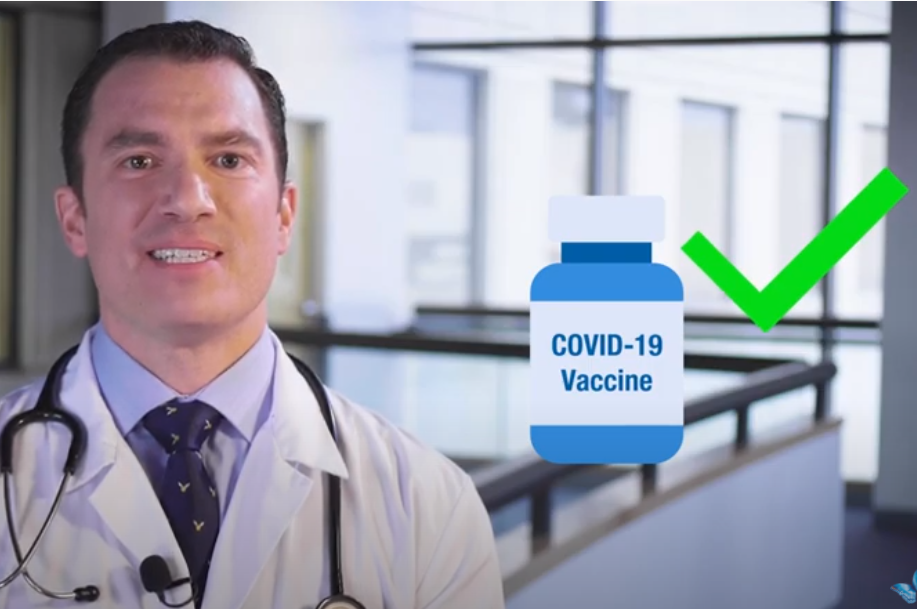Coronavirus (COVID-19)
Information for Patient Families
Caring Through COVID-19
Learn how we're keeping families safe at Nationwide Children's
Planning for Your Visit
The health and safety of our patients, families and staff has always been our top priority. During the COVID-19 pandemic our mission remains the same. With guidance from public health officials and our own medical experts, we are slowly and carefully opening our services more broadly again.
As you return to our facilities, you will notice many changes we’ve implemented to keep us all safe.
COVID-19 Vaccine Authorized for Kids 6 Months and Older
The Pfizer and Moderna vaccines have been authorized for children aged 6 months and older under an emergency use authorization.
Masking Guidelines
Hospital
- Masking in most Nationwide Children’s Hospital facilities is now optional. You will be asked to wear a medical mask in some areas including oncology units and in our NICU.
- Masking in patient rooms and other areas will be optional based on patient, family and clinical team preference.
- Medical masks are available at our Welcome Desks and in high-risk areas.
- Please help us keep our patients and staff safe. Wear a mask if you are not feeling well.
Outpatient / Ambulatory
- Masking in most Nationwide Children’s Hospital facilities is now optional.
- Please help us keep our staff and patients safe. We encourage you to wear a mask if you are not feeling well.
- Masks are available at our registration desks.
Children under 2 should never wear a mask. Click here to learn why.
Visitor Guidelines
- Visitor guidelines have been adjusted to pre-pandemic seasonal restrictions.
- There are no longer restrictions for outpatient visits.
- Viral season visitor restrictions are in place for select inpatient units. Inpatient visitor restrictions will remain for ICUs (including neonatal units), H4A, H8A and Hematology/Oncology. Parents/guardians may identify up to four additional visitors. Visitors, including siblings, must be 12 years of age or older.
Testing
Children may be required to be tested for COVID-19 prior to a test or procedure. Speak to your child’s care team with questions. Click here for tips on preparing kids for COVID-19 swabs.
Nationwide Children’s does not offer on-site COVID-19 testing, however there are many other options available for COVID-19 testing:
- Authorized at-home over the counter tests are available without a prescription and are typically available online or at local retailers.
- Through community testing centers: Test to Treat locations and community health centers.
- Through your child’s primary care provider.
COVID-19 Vaccine for Kids: Everything You Need to Know
BLOG: COVID-19 Vaccine for Children: How to Prepare Your Kids
Now that the COVID-19 vaccine is authorized for children 5-11 years old, it might be time to have a conversation with your kids about what the vaccine is, how getting it could make them feel, and why it’s important. Here are a few tips for having that conversation.
VIDEO: What would you tell my mom if she wasn’t sure about getting me vaccinated?
Dr. Dave Stukus has an important message for parents.

Q&A: COVID-19 Vaccines for Children 5 -11 Years Old: What Parents Need to Know
Currently, only the COVID-19 Pfizer vaccine is now authorized for use in children 5 to 11 years old. We answer parents' questions about vaccinating their kids.
COVID-19 Testing
Nationwide Children’s does not offer on-site COVID-19 testing, however there are many other options available for COVID-19 testing. To access a list of COVID testing locations from the Ohio Department of Health, click here. Or visit the websites of Kroger, Walmart, CVS Pharmacy or Rite Aid stores to review their COVID test options.
How do I get a COVID-19 test for my child?
- At home testing kits for patients 2 years and older (when collected by an adult).
- Authorized at-home over the counter tests are available without a prescription and are typically available online or at local retailers.
- Through community testing centers: Test to Treat locations and community health centers
- Through the child’s primary care provider
Does my child need a COVID-19 test before being seen at Nationwide Children’s? If my child has a scheduled procedure at Nationwide Children’s, are they required to get a COVID-19 test?
Nationwide Children’s will stop performing routine pre-procedural and hospital admission COVID-19 testing.
COVID-19 testing will still be required for:
- Patients with symptoms of COVID-19 (unless patient received a COVID positive test result in the past 10 days)
- All patients with a known COVID-19 exposure (regardless of symptoms)
If my child tests positive, how long do we need to quarantine?
The Ohio Department of Health offers guidance regarding what to do if your child is exposed to someone with COVID-19 or if your child tests positive for COVID-19. You can review the guidance here.


